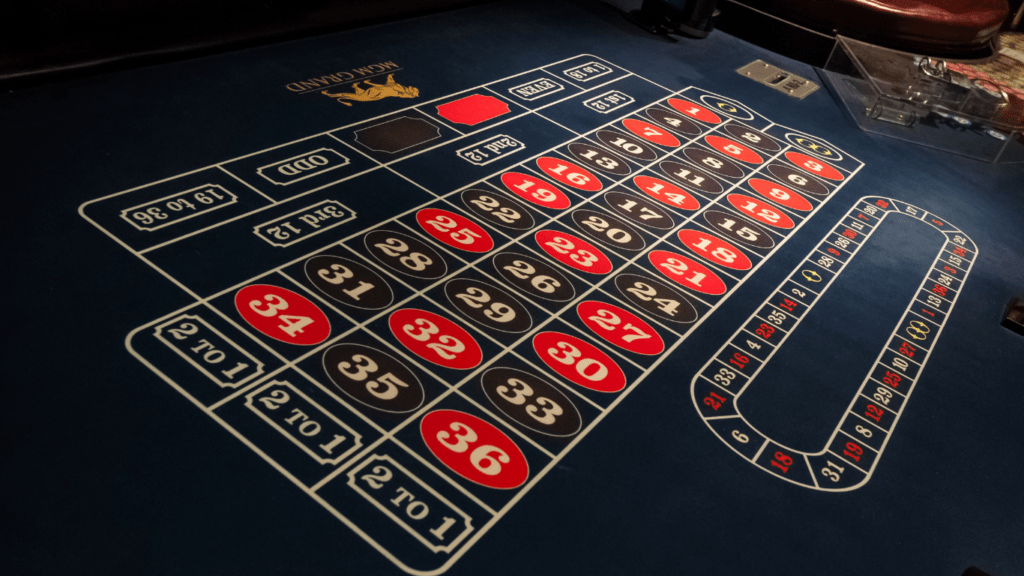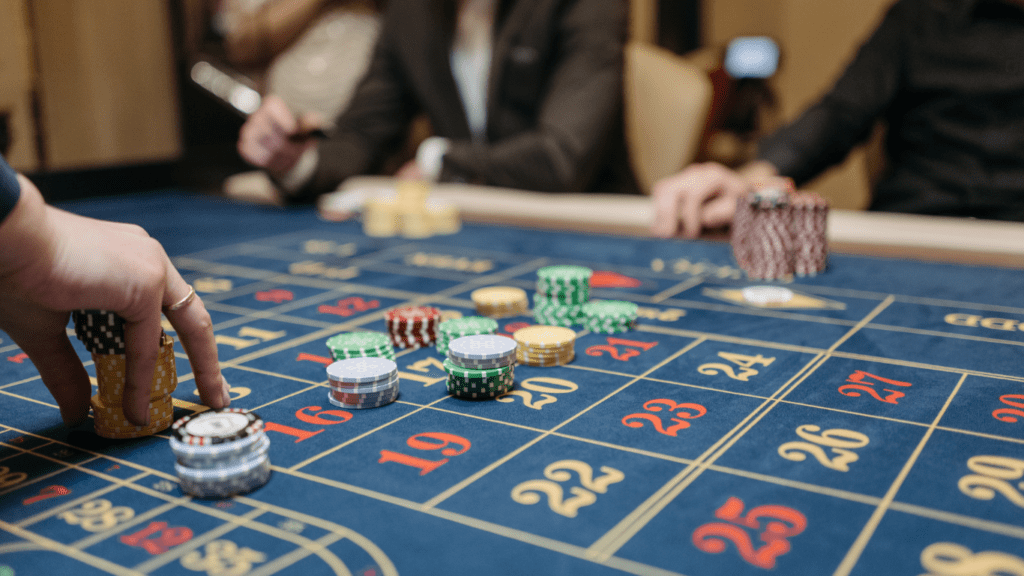Understanding Casino Table Games
Casino table games are a blend of fortune and tactical prowess. Each game, whether roulette or blackjack, offers unique dynamics. Understanding the rules and strategies is essential to success at the tables.
- Roulette Basics: Roulette involves predicting where a ball lands on a spinning wheel. The wheel’s segments vary in color and number, each representing different odds and payouts. Inside bets, like single numbers, offer high payouts with lower chances, whereas outside bets, like red/black, provide better odds with smaller returns.
- Blackjack Fundamentals: Blackjack requires players to beat the dealer’s hand without exceeding 21. Basic strategy involves making decisions on when to hit, stand, double down, or split pairs. Counting cards, a well-known strategy, can tilt the odds slightly in the player’s favor.
- Table Etiquette: Knowing basic etiquette enhances the gaming experience. Players should understand their responsibilities, like placing bets in time and not touching chips once placed on the table. Also, being courteous to dealers and fellow players contributes to a positive atmosphere.
- House Edge: The house edge represents the casino’s advantage over players. Games like blackjack have a lower house edge with optimal play, while roulette varies based on the type (e.g., American vs. European). Recognizing this helps in choosing games that offer better winning opportunities.
Decoding these elements helps anyone transform from a novice to a skilled player. Understanding these core principles shapes a confident and strategic approach to casino gaming.
Mastering Roulette
Roulette captivates players with its blend of chance and strategy. Knowing the basics is crucial for transforming casual spins into winning opportunities.
Roulette Basics

Roulette involves betting on where a small ball lands on a spinning wheel. The game uses numbers 0-36 on European wheels and an extra 00 on American ones. Inside bets focus on specific numbers, while outside bets cover larger sections like colors or odds/even. Winning odds differ significantly: a single number pays 35:1, while an even/odd bet pays 1:1. Understanding this structure helps strategize bets effectively.
Strategies for Success in Roulette
Successful strategies in roulette are about managing risks and rewards. One approach is the Martingale system, where I double my bet after each loss to recover losses with a single win. This works best on even-money bets like red/black. Conversely, the Fibonacci system is less aggressive, incrementing bets based on a number sequence. Choosing a strategy aligns with my risk tolerance and bankroll. Crucially, I limit my losses and never chase with more than I can afford, ensuring a sustainable and enjoyable gaming experience.
Blackjack Fundamentals
Blackjack centers on skill, strategy, and quick decision-making. By understanding its core principles, you can elevate your game and increase your chances of winning.
How to Play Blackjack
Playing blackjack involves strategic moves against the dealer. Each round starts with players receiving two cards, both face-up. The dealer hands themself one face-down card and one face-up card. The aim is clear: reach a hand value of 21 or as close as possible without exceeding it.
You can choose to “hit” for an additional card or “stand” with your current hand. “Doubling down” is possible when you’re confident, doubling your initial bet for one extra card. If you have two cards of the same rank, “splitting” creates two separate hands. Be mindful of the dealer’s face-up card; it heavily influences your choices.
Winning Strategies in Blackjack
Adopting effective strategies boosts your blackjack success. Basic strategy revolves around knowing when to hit, stand, double down, or split based on your and the dealer’s hands. Master card counting to track played cards and assess deck composition for a strategic advantage.
Pay attention to the dealer’s rule variations, like “dealer stands on soft 17”. These impact your decisions and potential outcomes. Setting betting limits helps manage risk, keeping your play sustainable. Practicing these strategies fosters a disciplined approach, essential for long-term success at the tables.
Comparing Roulette and Blackjack
Both roulette and blackjack captivate players with their unique blend of chance and strategy. However, understanding their core differences and similarities can enhance your gaming experience.
Similarities and Differences
Roulette and blackjack share a thrilling atmosphere and require understanding odds. Both are played on tables overseen by a dealer and can be enjoyed by both beginners and seasoned players. However, key differences set them apart:
- Game Dynamics: Roulette is primarily a game of chance. Players bet on where a ball lands on a spinning wheel. Blackjack, however, involves mathematical strategies as players aim to beat the dealer by reaching a hand value of 21 without busting.
- House Edge: Generally, roulette offers varying house edges depending on the wheel type. European wheels have a lower edge at 2.7%, while American wheels have a higher edge at 5.26%. Blackjack’s house edge can be as low as 0.5% when players use optimal strategy.
Choosing the Right Game for You
Selecting the ideal game depends on your personal preferences and skill set. For those who enjoy a relaxed, luck-based game, roulette offers straightforward betting options and the excitement of watching the wheel spin. If you’re inclined toward strategic decision-making and active participation, blackjack provides an engaging challenge that rewards skill and knowledge. Evaluate your gaming goals to decide which game aligns best with your style.



 Community Engagement Manager
Raymundo Stricklandics serves as the Community Engagement Manager for Dice Gamblers Deal, where he is dedicated to creating meaningful connections with the platform’s audience. His role focuses on fostering an active, engaged community of players by interacting with readers, answering their questions, and ensuring their experience with the site is both enjoyable and informative. Raymundo is deeply passionate about building relationships with fellow gambling enthusiasts, whether through social media, email communications, or direct interaction on the site’s forums. He works tirelessly to ensure that the platform not only provides valuable information but also offers a supportive space where players can share their experiences, tips, and success stories. Raymundo also plays a key role in customer support, addressing user inquiries and providing personalized advice to help players navigate the world of table games and betting strategies.
Community Engagement Manager
Raymundo Stricklandics serves as the Community Engagement Manager for Dice Gamblers Deal, where he is dedicated to creating meaningful connections with the platform’s audience. His role focuses on fostering an active, engaged community of players by interacting with readers, answering their questions, and ensuring their experience with the site is both enjoyable and informative. Raymundo is deeply passionate about building relationships with fellow gambling enthusiasts, whether through social media, email communications, or direct interaction on the site’s forums. He works tirelessly to ensure that the platform not only provides valuable information but also offers a supportive space where players can share their experiences, tips, and success stories. Raymundo also plays a key role in customer support, addressing user inquiries and providing personalized advice to help players navigate the world of table games and betting strategies.
